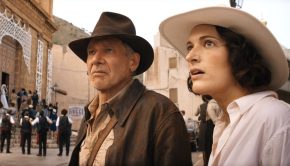Spooky TFS – Train to Busan
We kick off our spooky TFS Halloween movie coverage with Blake looking back to 2016 for the South Korean modern zombie classic, Train to Busan.
Somewhere in the mountains, a rusty van stops at a highway quarantine station. Workers dressed head-to-toe in white coveralls spray down the vehicle as the farmer speaks to the man in charge. What is it this time? The supervisor assures him that nothing is wrong, just a small leak at the site ahead. So begins 2016’s Train to Busan, a zombie-thriller directed by Yeon Sang-ho and one of the latest entries to South Korea’s impressive repertoire. For the month of October, I’ll be taking a look at some of my favourite Asian horror films to get in the holiday spirit. This adrenaline-filled popcorn masterpiece has a heart and an idea, making it just as good as any Hollywood blockbuster made in recent years.
Train to Busan has a simple but effective set-up benefiting mostly from the father-daughter relationship at its core. Seok-woo is a divorced, self-serving hedgefund manager. He’s great at his job but struggles to be present in his young daughter Su-an’s life. In many ways she is the opposite of him, constantly looking out for and helping others. When Su-an asks to go to her mom’s in Busan for her birthday, Seok-woo resignedly accepts. The drive to the station the next morning is filled with dark omens. Sirens wail in the empty streets. Ash floats in the sky like falling snow. In the distance, Seok-woo and Su-an can see a skyscraper raging red with fire. The virus is slow to bare its fangs but the build-up to its violent eruption is palpable. Soon enough, the pair find themselves throttling down the tracks with the undead onboard as rumours abound about a safe zone somewhere further down the line.
Vicious and quick-footed, the zombies in this film are unrelenting in their pursuit of flesh. Their makeup looks appropriately grotesque and deaths are grisly with copious amounts of bloodshed. Despite being formidable, the zombies aren’t unbeatable. Yeon Sang-ho does a great job of letting the audience and characters discover together how they can be beaten. Action sequences are brilliantly choreographed and somehow find innovative ways to make use of train cars in each scene. An added bonus is that the cinematography is bright and colourful, making for an easy on the eyes viewing experience. Beyond a few moments of janky CGI, Train to Busan has a perfectly slick presentation.
All of the performances are terrific as well, specifically Yong Goo’s charismatic turn as the father and Kim Su-an’s great child performance. The other real standout for me was Ma Dong-seok who played the affably strong Sang-hwa, a passenger serving as both comic relief and moral backbone on the train. Korean cinema is littered with extremes and Train to Busan doesn’t neglect in the melodrama department. As the passengers are whittled down we get over-the-top farewells for the characters we’ve come to care about. For a film with such high stakes, these excessive goodbyes fit the tone perfectly and make for an emotional experience.
Apart from the technical aspects, what really sets this zombie-thriller apart is its sharp social commentary. From the opening moments of the farmer at the checkpoint, Train to Busan grapples with the idea of big business and how it exploits those beneath them to get ahead. As opposed to most horror films, none of these characters die because of their own stupidity. Yeon Sang-ho recognizes that the best way to see the personality of the characters is to put them in life-or-death situations and see what they do. On one side is the righteous Sang-hwa who does everything he can to protect not only his pregnant wife but everyone else aboard the train. At the other end is the nefarious COO Yon-suk, a man that uses every opportunity to sabotage others and increase his own odds of survival. Somewhere lost in between them is Seok-woo, residing in a grey area where the films big ideas live.
The emotional arcs for Seok-woo revolve around his redemption as both a “bloodsucker” businessman and an absent father. Despite caring deeply for his child, Seok-woo is selfish to the highest degree. At the start his approach to the outbreak is similar to Yon-suk. His first instinct is to call in favours from people in high places to help only him and his daughter. Although it’s understandable to protect Su-an, the lengths that he goes to often puts the lives of others in danger. Many of the train passengers fall victim to Yon-suk’s cutthroat tactics, but it’s easy to say everyone would be okay if it weren’t for that mysterious company in the mountains. Rot starts at the top and soaks down to the bottom, poisoning everything in its path. Eventually it’s revealed that the mystery company was a key investment for Seok-woo’s hedgefund. The oversights he made for the sake of profits were likely directly responsible for the zombie outbreak. Despite making these poor decisions, Seok-woo somehow remains a redeemable presence throughout. With the help of his daughter, he evolves from a self-centered man to an altruistic force for good, making for a thought-provoking take on greed in the process.
Instead of relying on cheap thrills or excessive visual effects, Train to Busan’s attention to its action, characters, and story helps create an entertaining treat. Complete with big emotions and tons of breakneck fun, Train to Busan is the perfect horror film to kick-off the month of October.














